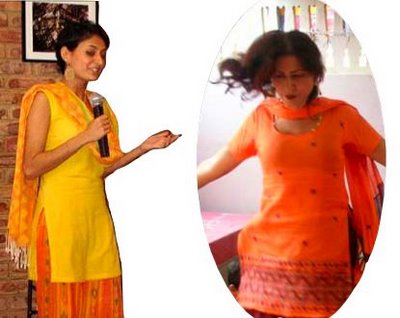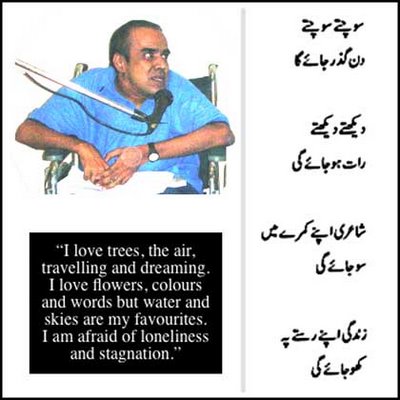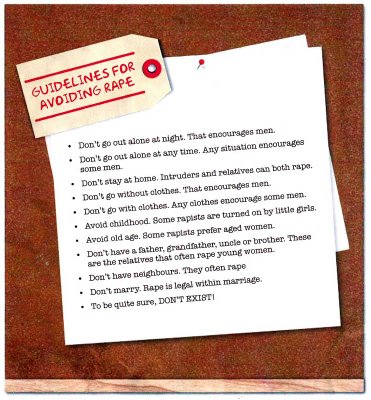Sunday, April 27, 2008
Friday, April 18, 2008
Sharing RSF's Press Release
 Reporters sans frontières (Reporters Without Borders) sent an open letter yesterday to Prime Minister Yousaf Raza Gillani hailing a bill introduced by his government in the national
Reporters sans frontières (Reporters Without Borders) sent an open letter yesterday to Prime Minister Yousaf Raza Gillani hailing a bill introduced by his government in the national assembly to repeal repressive amendments to a 2002 broadcast media law that were decreed by President Pervez Musharraf on 3 November 2007.
"This is a victory for the editorial freedom of the TV and radio stations that were the target of many sanctions and attacks by the previous government," the organisation wrote.
Among the draconian amendments to the PEMRA 2002 broadcast media law that would be repealed by the new bill, introduced by information minister Sherry Rehman on 11 April, is a provision for sentences of up to three years in prison for journalists who defame or make fun of the president.
Reminding the new prime minister that he holds a Master's degree in Journalism and that his government has voiced support for press freedom, the letter proposes the following 10-point plan for achieving a lasting improvement in the situation of press freedom.
The letter concludes: "We are aware that the task you face is enormous, but we hope that your convictions will lead you to make it a priority to strengthen press freedom. Our organisation also hopes that you will give your personal attention to these matters and that you will encourage your government to consolidate a climate in which journalists can work freely and without fear."
"This is a victory for the editorial freedom of the TV and radio stations that were the target of many sanctions and attacks by the previous government," the organisation wrote.
Among the draconian amendments to the PEMRA 2002 broadcast media law that would be repealed by the new bill, introduced by information minister Sherry Rehman on 11 April, is a provision for sentences of up to three years in prison for journalists who defame or make fun of the president.
Reminding the new prime minister that he holds a Master's degree in Journalism and that his government has voiced support for press freedom, the letter proposes the following 10-point plan for achieving a lasting improvement in the situation of press freedom.
1. Repeal the RPPO 2002 ordinances restricting the editorial freedom of the print media which were also adopted last November."Both the repressive policies of the previous governments and terrorist actions have resulted in a very disturbing deterioration in the situation of press freedom," the letter says. "Pakistan was ranked 152nd out of 169 countries in the 2007 world press freedom index compiled by Reporters Without Borders."
2. Reform the operational methods of the Pakistan Electronic Media Regulatory Authority (PEMRA), which is currently run by former police officers. The PEMRA must grant terrestrial broadcast licences to independent TV stations, guarantee the editorial independence of TV and radio stations and stop harassing cable TV operators.
3. Release imprisoned journalists Rehmat Shah Afridi, the former editor of the Frontier Post newspaper, and Munir Mengal, one of the initiators of the Baloch Voice TV station. Two other journalists from Balochistan are missing and the reasons for their abduction are unknown. It is important to locate them and ensure that their rights as citizens are respected.
4. Introduce training for the police, army and the intelligence agencies (including the ISI) on the importance of the work of the media, in order to avoid further violence against journalists, especially during demonstrations. At least 30 journalists were seriously injured in 2007 and more that 120 were arrested.
5. Award financial compensation to journalists who have been arbitrarily detained, beaten or otherwise harassed by the security forces and to the families of those who were killed in 2007 and early 2008.
6. Provide for the protection of news media that are threatened by terrorist groups.
7. Withdraw all the unjustified complaints and lawsuits brought by the police and government against dozens of journalists and free speech activists in recent years.
8. Combat impunity by creating a Task Force to investigate the murders of journalists that have taken place in recent years. Six journalists were killed in 2007 without any of these murders being solved. Pakistan has become the most dangerous country for journalists in Asia.
9. Release the report of the investigation into the kidnapping and murder of Tribal Areas journalist Hayatullah Khan in 2006.
10. Turn state-owned PTV into an independent public television service. Monitoring of PTV's broadcasts by Reporters Without Borders during the elections showed a clear bias in favour of the ruling party.
The letter concludes: "We are aware that the task you face is enormous, but we hope that your convictions will lead you to make it a priority to strengthen press freedom. Our organisation also hopes that you will give your personal attention to these matters and that you will encourage your government to consolidate a climate in which journalists can work freely and without fear."
(By the way, fellow bloggers, the WPF Index headline is: Bloggers now threatened as much as journalists in traditional media.)
Thursday, April 17, 2008
A great leap forward
When my daughter, Ragni, screened her very first short film (Bindiya Chamkay Gee) - during one of T2F's Cinema for Change sessions - the star of the documentary was also the star of the evening, answering questions and countering comments (some rather accusatory) with a confidence that many had not expected. But then they had never met a Hij∂a like Bindiya!

Among the post-event post-Q&A discussions that followed within small groups (and the place was buzzing) there was one recurring thought: Given the scale, number, and variety of problems developing countries face, it was a wild fantasy for Bindiya or her supporters to imagine that the difficulties encountered by such a small subset of the population would even be on the radar of the governments of any of the countries in the majority world (to use Shahidul Alam's term of choice). Some felt that the vote-bank was not large enough for any politician to try and woo. Others, that any decent politician (yes, it is possible, though admittedly rare) who truly wished to support such a cause would be mocked so much that he would lose his general credibility.
It was a joy, then, to see this news item from our 'neighbouring country' (a euphemism that our state media uses for India, lest the invocation of the actual name result in that evil genie materialising and devouring us).
DISCRIMINATED AGAINST and forced to live in secluded communities, India’s hijras have always had to fight for basic entitlements. Two weeks ago, however, a major victory was achieved when Tamil Nadu added a third gender to ration cards. Hijras may now enter a ‘T’ (for transgender) in place of a ‘M’ or ‘F’ on ration cards. The move makes Tamil Nadu the first Indian state to officially recognise its hijra citizens.Incidentally, the article is by Morgan Harrington, who was at Hampshire College with Ragni. Read the whole story
Labels: Activism, Events, News, Pakistan, People, Personal, Politics, T2F
Sunday, April 13, 2008
Zeeshan Sahil - Lonely no more!

An Evening with Zeeshan Sahil was the event that
launched T2F. Only last week he'd called to say
that he'd be glad to do another reading
there ... and I began thinking of an
event for T2F's first birthday
that would bring him and
other Urdu poets
together.
Yesterday
Asif Farrukhi's call
shattered me completely.
Zeeshan's voice had suddenly been stilled!
He will be missed by everyone
who came into contact with him or
Most of all, he will be missed by his love: Karachi.
Only a few days ago,
Fatima Bhutto,
wrote this.
Zeeshan Sahil, an Urdu poet once wrote of our city, our home, "It is a lie that in Karachi, after the rain, the sprouting grass doesn’t have blades deep green and soft. Or that the trees do not give shade without the help of clouds … With us in Karachi live birds who fly from trees through the sound of bullets and bombs; perch on walls; always they gather somewhere to pray. Our books don’t wait inside cupboards for termites. Now our hearts swim these seas where once our eyes searched for golden flowers and our hands tear down the walls that once buried us alive". This, like the calling of Sahil’s birds, is a prayer for us and for our city, our home. Let us await the day that our hands tear down those walls; it won’t be long.
Amen!
Labels: Bloggers, Books, Literature, News, Pakistan, People, Personal, Poetry, Urdu








